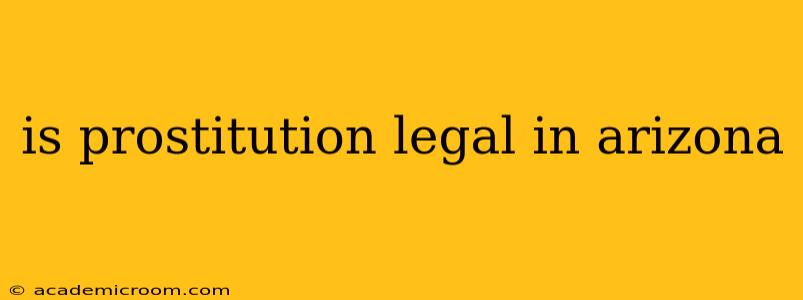The short answer is no, prostitution is illegal in Arizona. However, the nuances of the law and its enforcement make it a more complex issue than a simple yes or no. This article will delve into the specifics of Arizona's prostitution laws, addressing common questions and misconceptions surrounding this topic.
What are the specific laws against prostitution in Arizona?
Arizona Revised Statutes (A.R.S.) Title 13, Chapter 14, specifically addresses prostitution. These laws criminalize various aspects of the sex trade, including:
- Prostitution: Engaging in sexual conduct for a fee is explicitly illegal.
- Soliciting prostitution: Offering or agreeing to engage in prostitution is also a crime.
- Pimping and pandering: Facilitating prostitution through recruitment, management, or other means is severely penalized.
- Patronizing a prostitute: Paying for sexual services is a criminal offense.
These laws cover a broad range of activities, aiming to suppress all aspects of the commercial sex industry within the state. Penalties for violating these laws can include fines, jail time, and a criminal record, with the severity depending on the specific offense and any aggravating circumstances.
What are the penalties for prostitution in Arizona?
The penalties for prostitution-related offenses in Arizona vary depending on the specific crime and the offender's prior record. These penalties can range from relatively minor fines to substantial jail time. For example, a first-time offense of soliciting prostitution might result in a fine and probation, while repeated offenses or involvement in more serious aspects like pimping could lead to significant prison sentences. It is crucial to note that any conviction will result in a criminal record, which can have long-lasting consequences impacting employment, housing, and other aspects of life.
Are there any exceptions or nuances to Arizona's prostitution laws?
While Arizona has strict laws against prostitution, there aren't any broadly recognized exceptions. However, the application of the law can vary depending on specific circumstances. For example, certain types of sexual conduct might be legally permissible outside the context of commercial exchange, and law enforcement priorities can influence how these laws are enforced. It is vital to understand that attempting to exploit any potential loopholes carries significant legal risk.
Is there a difference between prostitution and sex trafficking in Arizona?
Yes, there is a significant difference. While both involve commercial sex acts, sex trafficking is a far more serious crime that involves coercion, force, fraud, or threats. Victims of sex trafficking are not considered criminals; instead, they are recognized as victims of exploitation and are entitled to legal protections. Arizona has specific laws targeting sex trafficking, reflecting a broader national effort to combat this serious human rights violation. If you suspect someone is a victim of sex trafficking, it's crucial to contact law enforcement immediately.
How does Arizona's approach to prostitution compare to other states?
Arizona's stance on prostitution is relatively strict compared to some states, particularly those that have decriminalized or legalized certain aspects of the sex trade. However, many other states maintain similar or even stricter laws. The legal landscape surrounding prostitution is constantly evolving, and it’s important to understand the specific laws of the state in question.
Disclaimer: This information is for educational purposes only and should not be considered legal advice. If you have questions about Arizona's prostitution laws or need legal assistance, consult with a qualified attorney.
